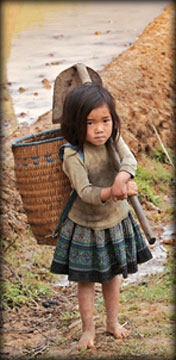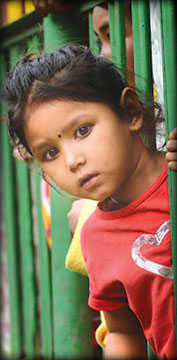 |
|
A brighter future for
all girl children |
It’s time to act:
Protecting the girl child from abuse
By Carol Aloysius
Living in an increasingly violent world with few protective
structures to defend her, the girl child has never been more vulnerable
to abuse than she is today.
Whether physical, sexual or psychological, it is girls more than
their male counterparts that suffer when it comes to violence,
discrimination and deprivation of their rights.
Girls grow up to be women, mothers, homemakers and income earners.
Yet, despite the numerous Charters and laws enacted on behalf of women
everywhere from the 90s, there seems to be very little let-up when it
comes to actual physical and sexual violence on women and girls.
Violence against girl children begins in their homes when fathers
commit incest on their daughters, and brothers on their sisters. This is
most evident in the estate sector where a drunken father would sexually
abuse his daughter even in the presence of his wife. So grave is the
problem that many upcountry estate mothers send their daughters to
Colombo to work as domestics just to protect their virginity till they
attain puberty and are ready for an early marriage.
Sexual abuse does not stop there, however. Instead, often the master
of the house abuses the girl in the absence of his wife, threatening the
child he would punish her severely if she informed his wife. The girl is
also abused by the sons who too threaten to punish her if she informs
their mother. When she finally returns home, too frightened to tell her
mother the truth, she is rejected by her husband when he discovers that
she is not a virgin and is ostracised from her community.
Offence
Employing children under 14 years as domestic labourers is now
considered a criminal offence. However, the practice still continues in
many forms for young people between 14 and 18 years who, in the eyes of
the law, are still considered children.
 |
|
A burden too heavy for her shoulders |
 |
|
Peering out, what does
she see? |
Hence, the recent call by former Vice Chancellor of the Colombo
University and Emeritus Professor of Law Dr Savitri Goonesekere to ban
the employment of persons between 14 and 18 years in domestic service,
is both timely and a step in the right direction. She was quoted as
saying that females in this age group ran a high risk of being subject
to sexual harassment in domestic service.
Making these observations at a panel discussion on the ‘Girl Child in
Sri Lanka’ organised by the United Nations at the Institute of Policy
Studies to mark the International Day of the Girl Child, Dr Goonesekere
called for the amendment of the Employment of Women and Young Persons
and Children’s Act, to add Domestic Service as a hazardous occupation,
pointing out that not only girls, but male children in domestic service
would also receive protection under such an amendment.
Labour Commissioner General Pearl Weerasinghe, who was at the
discussion, is reported to have said there were 51 hazardous forms of
occupation listed by the International Labour Organization. Giving a
picture of the Lankan working child, he noted that child labour
prevailed in domestic service, on the streets, in shops, garages,
restaurants, as begging and in family businesses. Since they belonged to
the non-formal sector, it was pointed out that such work was difficult
to monitor, and those who use children for their own ends including
parents know how to circumvent the law.
Problems
The girl child’s problems do not end there. Take the case of Ramani
who had ambitions of becoming a teacher. Her dreams ended when she was
forced to drop out of school at Grade 7 when her mother asked her to
stay home and look after her siblings, while she (the mother) worked as
a casual labourer sweeping the streets.
When the school principal visited the girl’s house and insisted that
she be sent back to school, her mother asked, “Who will keep the home
fires burning, now that my husband is no longer living (he passed away
last month)?” Since the school authorities were unable to provide a
child-minder for the family, Ramani now languishes at home, studying by
herself and still dreaming of a future career as a teacher.
Ramani’s plight is shared by hundreds of young children, mostly
girls, in this country, whose potential to improve themselves remain an
unfulfilled dream through no fault of theirs, and largely due to the
lack of a proper child-minding network.
Penalties
True, we have laws that make it compulsory for children to attend
school till they are 14. True, we have enhanced penalties for rapists,
for those who dabble in pornography and for those who lure children to
commercial sex. Yet, the fact is that the number of victims (girls and
boys) continues to spiral, with an estimated 30,000 or more commercial
sex workers in the country of whom a large number are young children.
 |
|
Many children are
forced into labour to keep the home fires burning |
Passing Acts and signing Charters to protect women and children,
girls in particular are not enough. We need to give teeth to the laws we
already have and make sure they are put into action.
Take our laws against domestic violence. Although the official count
of reported cases, (such as those of children in domestic service) has
tumbled due to amendments to this law, we all know that the Lankan woman
continues to suffer violence perpetrated on her by her husband or
partner.
The fault lies in our cultural practices which only promote passive
acceptance of such violence and the shame women face when the truth is
exposed, fear of revenge from her husband and most of all her shame of
being divorced. Added to that is the fact that most domestic violence
incidents take place among low income families where the education level
of the woman is low and she does not have any skills which would enable
her to leave her husband and start life on her own.
Empower
The need of the hour, therefore, is to give these women tools, life
skills and education to empower them so that they need no longer be
subservient to those who perpetrate such violence on them. Such
education must begin early, starting with the girl child.
The fact that teen pregnancies are on a high even in conservative
communities such as Batticaloa, as noted by a leading child welfare
authority recently, calls for more education on reproductive health and
the facts of life. It also calls for more attention to the girl’s health
status. A malnourished, anaemic girl is likely to give birth to a low
weight baby who could be stunted and have a low IQ.
For child activists and women activists, the time to act is NOW...
Tomorrow may be too late, for our future citizens in general and the
girl child in particular. |

